If only you had thought ahead, you would have stocked snacks and biscuits, bread and cake, and vegetables suited for Amma or pondatti to make your favourite bajji and pakoda, observes N Sathiya Moorthy.
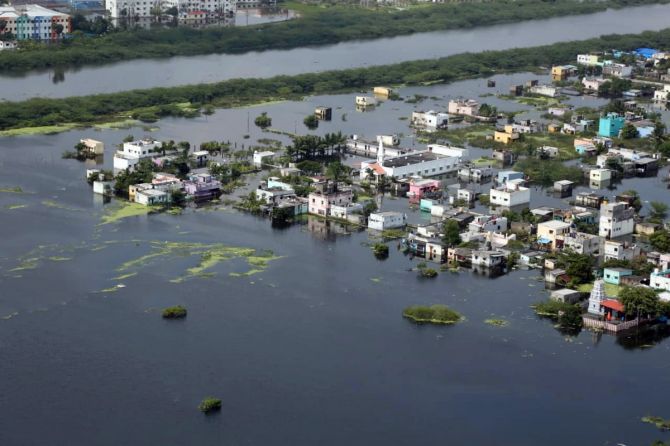
Now that the rains and resultant flooding have subsided, you can expect the average Chennaiite to forget it all until another day when it all recurs.
Such recurrence of both the cyclone-induced rain storms and the Chennaiite's rantings are not going to be rare but periodic, only that there is no predictability to its periodicity.
It is true that this year's was the third in eight years, after those in 2015, 2016 and now 2023. Before that there was another in 2005.
This is not as if there were no rains and floods before them. Through the past century and obviously earlier too all of it had happened.
There is not much of reportage from the distant past, yes, but that does not mean that they were not there.
Talk to any oldie in the city, he would tell you the story -- rarely his own and mostly as rendered by his late parent or uncle.
It's about the Chembarambakkam reservoir bursting and flooding Mylapore near to the mouth of the Adyar river, 32 km away, in the early forties.
For the uninitiated, the reservoir-burst flooded the river, which flowing down towards the sea, inundated residential areas and farm lands on either side.
In the same breath, if you wait to hear him out, the oldie would also tell you that how even in his time this contemporary era, southern suburban localities like Perungudi and Velacherry were farm lands, marshes or lakes. In his father's growing-up years, farms lands separated Myalpore and Mandavellipakkam.
There was no habitation between the present-day Kodambakkam flyover and Vadapalani, where film studios sprouted up.
One reason was that residents who otherwise patronised cinemas and cinema halls saw film-making as a sinful exercise fit only for 'outcasts'.
The land area between the two localities had coconut and mango groves.
Likewise, the vast area covering the present-day Gemini Circle/Anna Flyover end of Nungambakkam High Road, all the way up to CIT Nagar, and covering T Nagar on the other end was a huge lake.
Less said about the site of present-day Valluvar Kottam, the entire Shenoy Nagar/Anna Nagar locality (Aminjikarai was the outer even 50-60 years back).
In the late sixties, when the DMK state government organised an industrial exhibition in the virgin lands, the Visweswaraya Tower put up for the occasion was visible miles away. Today, it has been so dwarfed and crowded that you cannot see it even from the street-corner.
Ambattur was discovered, likewise, when the previous Congress government of chief minister K Kamaraj facilitated the ruling party's organising the famous 'Ambattur Congress', where the 'nation' adopted 'democratic socialism' as the creed.
The area was then developed as an industrial estate in the suburbs, but in recent decades it all has developed into a residential locality like any other.
So are older North Madras localities like Vyasarpadi, Purasawalkam, Perambur and Ayanavaram, which were all villages, separated by low-lying farm lands or mango or coconut groves.
Travelling by city bus, if you have a bus conductor who is in the middle-aged and is a native of the locality, he would shout of the names of bus-stops by their original names, which invariably end up with the prefix, 'thottam', meaning a garden or grove.
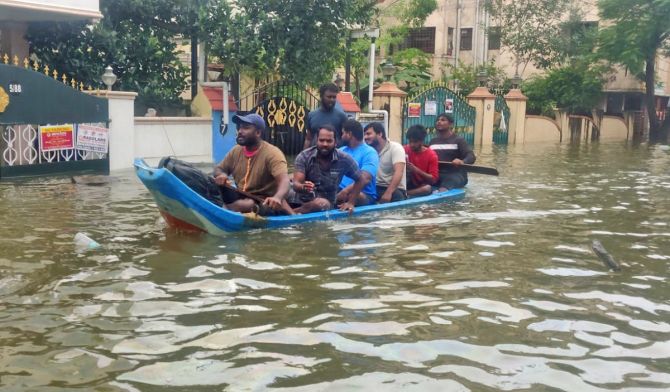
The list is endless, so are the woes of the citizen but then, he has not learnt from his own past experiences.
First and foremost, those that complain about lack of electricity and water-supply, food and the like tend to forget that they had suffered the same plight on previous occasions, and knew exactly why.
Owing to fear of accidental electrocution caused by fallen trees and power-poles, the authorities have always shut down power at the first signs of heavy rains, and more so cyclonic storms.
This time, there was no cyclonic storm of the past variety, say, like Vardha in 2016, which uprooted some of the decades-old trees that otherwise, looked tall, strong and well-rooted.
Post facto, botanists told you that most such tress were alien to the land, and possibly the children and grandchildren of those that were originally planted here by erstwhile colonial masters.
If there is no electricity, after the second day there is not going to be any water in your over-head tank or tanks, depending on whether you lived in an independent house or an apartment building.
Even where you have retained the inverter from the unprecedented months-long power-outages from the first decade, either you have not serviced it or have already sold it off as 'raddi' long ago.
Of course, even with one, in the absence of periodic power-supply, you could not have charged it after it ran out, say after three or four hours.
What then about stand-by battery-lights, or better still the more reliable candles and match-boxes? Most homes may have match-boxes, but as luck would have it, there would only be one, with half a dozen broken sticks.
Candles are a rarity in many homes. So be it. But there is no harm buying and stocking them up, at the beginning of every monsoon season.
The first week of October is a safe bet -- but did you do that?
So does it go with the LPG refill cylinders, which for many residents in the younger generation, comes from private suppliers with no queues and waiting-period.
Those that have their supplies from a PSU oil company used to begin planning their purchase cycle effectively two or three months in advance, but even they have learnt from their own younger generation and have made forgetfulness in such matters a second nature.
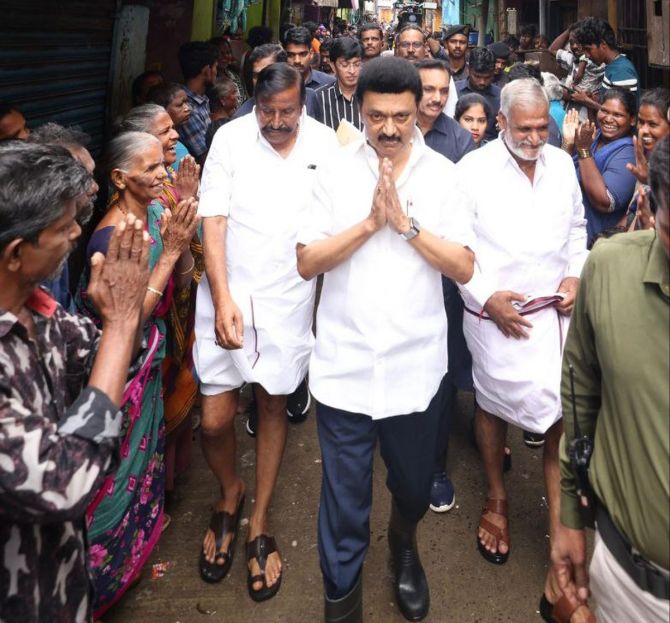
If minimum cooking and lighting can be organised thus, what about food material, particularly dry rations? There will at least be the monthly quota of rice and atta, grams and oil, still left (as long as you stick to the periodicity of refilling those dabbas in your kitchen).
Only that those dabbas have to be large enough, or your family has to be small enough, nuclear ones.
The problem comes when suddenly everyone in the family can do with a cup of filter coffee, or at least tea ('aabaththukku paavam illai', loosely translating as 'make-do with whatever you get'). And they would want it repeats and refills, what with there is nothing do without electricity, including watching those sob soaps on the TV.
You did not stock milk, yes, and whatever was there in the fridge has already been consumed.
If there is no power-supply to the entire city, even the milk bottling plants would have been shut down.
The chances are that they were flooded even before your home and locality were.
You can't stock too much of milk sachets in a fridge that could give way without power-supply, yes. But why not stock milk-powder? If your filter coffee would not taste good a cuppa tea would still taste better when made with tinned milk-powder, isn't it?
If only you had thought ahead, you would have stocked snacks and biscuits, bread and cake, and vegetables suited for Amma or pondatti to make your favourite bajji and pakoda. Or, make it yourself and serve it to them all. Or, all of you adults at home take turns doing the cooking, cleaning and washing....
Time used to be until a couple of decades ago, when during heavy rains and floods, families used to gather in one of the apartment flats, and take turns without drenching too much, and do pot-luck lunches and dinners.
It used to go on and on for a week to ten days at times, as one cyclonic storm followed another, leaving you with little or no choice.
That way even a stock of medicines and syrups for common cold, headache and stomach ailments may come in handy.
It does not harm you to check the stocks in the family's First Aid kit if you have one. Else, buy one when you restock your kitchen for the rains.
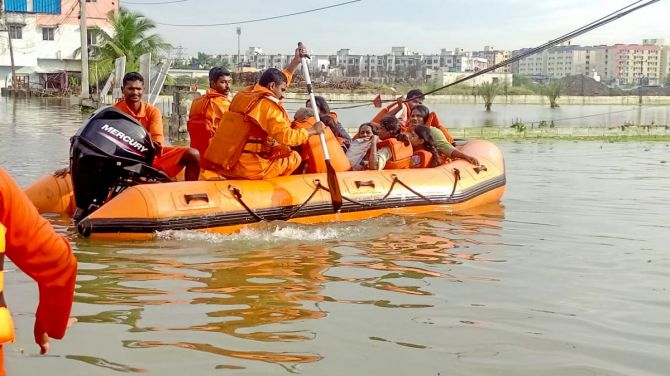
But then, those apartment buildings were built on solid ground, where the old-world construction company's owners localised to the city, grew up knowing and learning the terrain, water-flow and outflow, and built those buildings two or three feet above street-level.
Of course, they built homes for the up and coming middle class who did not own a car.
Anyway, they could not have saved or repaid loans for an apartment/flat and car at the same time.
It may surprise many to know it, but either before paying the advance money to the builder (and you paid it in instalments against the quantum of work promised and/or executed as per a committed schedule), the buyer would invariably visit the construction site at various times in successive months.
Yes, it used to be difficult and risky to do so, but he would certainly have marked attendance in rainy times, if not at the height of the cyclone, to see the water-level for himself.
Definitely after the cyclone had receded and water-levels, too, he would visit the locality to make enquiries, on the water-levels and the difficulties faced by residents in other buildings.
Only then would he make a final call on purchasing the property. Maybe he was old style, conservative and more, but it worked -- for him and his family at the very least.
In the generation that is ours, even old-timers have only a nodding acquaintance with their neighbours in their suburban apartment buildings.
You pool in the apartment's foyer only for the monthly/quarterly building meetings to abuse the association office-bearers, but without taking up the posts yourself.
On annual occurrences like heavy rains, floods and cyclones, you gather there, only to shout out your grievances, that too at the helpless, hapless, poor security guard, who is invariably an outsider to the city, who is also equally already hungry, hence angry, and is still impotent to resolve your problem, or even shout back at you.
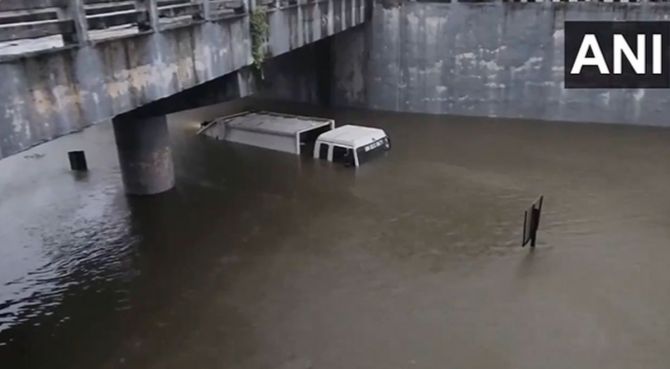
Where then does the fault lie? Is it only with the government, corporation authorities, elected and otherwise? What was/is your larger contribution to your own present plight?
Yes, most builders cheat on the government, and corrupt politicians and bureaucrats connive with them, to construct all those apartment houses on low-lying areas, at least in cities like Chennai.
Just take a look at the ground on which your apartment stands, either from your bedroom window, or from the gate of your building.
Is not the entire locality built three to six feet below the street-level? Because you were invariably driving down, or riding on your bike into those posh localities, you could afford to ignore the visible curvature on the road, as you climbed onto the street from home locality or drove down back home.
Not all those apartments are built on encroachments; especially what once were lakes and ponds. There is any number of such constructions all across the city.
However, many, and possibly most apartment buildings in the suburbs have come up on what was not very long ago, farm lands.
Growing up in the city, you have passed them from the southern ridges to the airport or beyond, especially when appa wanted to drive in peace and avoid traffic-jams on the main, arterial road.
Today, they are all concrete jungles, because they grew up haphazardly and did not provide for water-escapes.
You did not consider water-logging, as you were busy running around arranging for your home loans (and the builder had contacts in one commercial bank or the other), then looking around for fittings and furnishing that should beat that of your colleague, sister or sister-in-law as the case maybe.
The irony with Chennai 2023 is that even those who had suffered huge losses in the sudden flooding of 2015 (after the government let off huge volumes of Chemparapakkam flood waters, down the Adyar river in the middle of night, that too without notice), did not consider shifting to another locality through the past eight years.
Yes, money does not grow on trees for you and me, but then, there are choices to make -- and the choice you made at the time is what you learn to live with it now.
There is still the tricky question to negotiate, namely, your car-park. Because your apartment building is already below the street-level by feet, your car-park which is invariably a basement of some kind, is the first to inundate and the last to be de-watered days later, when heavy rains and floods target the city.
Those that had learnt from the 2015/16 experience thus made an early decision this time, to park their cars on a high-ground -- as those open streets feet above you.
Those who did not do so -- whether they were new residents or old –faced additional suffering and loss (even though the insurance company compensated them).
That in almost every building as if by rule (and there are no rules), the electricity connections and meters are located at the lowest level, invariably the basement or the on the ground floor, at a level invariably below the stair-case and the lift.
In all those buildings that have a generator, it is also at such a height. The rest, in times of floods, need not be said.
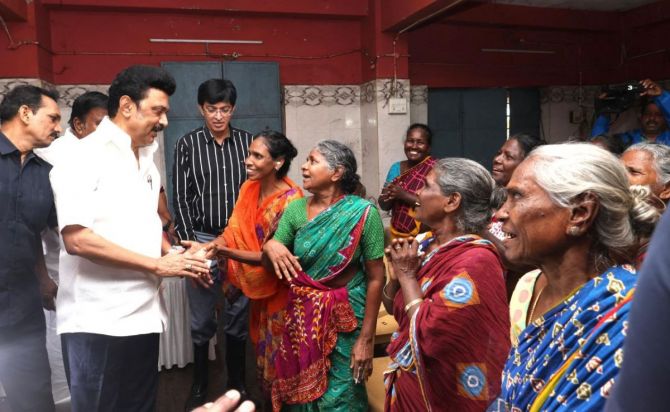
All of it does not mean that the government and the municipal authorities have no responsibility or accountability.
This time round, there were reports that officials (leave aside politicians, especially of the ruling party and their ministers) did not show up in some localities three or four days after the rains had stopped – but the water had not receded.
But there were also reports of corporation and other officials readily picking up their mobiles (if your own mobile had power-charge and your network provider too was not affected as much), then explaining the ground realities better than his or her bosses in the Secretariat, and most certainly the ministers.
As they explained, the drainage system, though re-built in the past months, could have carried the flood waters, the unprecedented heavy rains -- 53 per cent in 36 hours – did it in.
There was no way the authorities could clear flooding in your locality immediately as the drainage and sewer systems were overflowing with rain water.
Adding to the woe was the phenomenon of high tides blocking the river waters flowing into the sea, and instead pushing sea water into the river, which was already flooded with the rain waters it had collected all along the route.
The government's response is how to change it all, as owing to climate-change or poor land-management in recent decades or both, the periodicity of heavy rains, and at times cyclonic storms, and also their severity have only been increasing.
Of course, the authorities cannot dictate terms to the rain god and sea god on the quantum and tide-levels, but they have to ensure through strict law and stricter enforcement that at least in future apartment and office buildings cannot be built below street-level (without filling it up).
Likewise, for old buildings and new, they have to order the reinstallation of electricity supply-connections and generators. Because there was no cyclonic storm this time, the power-cuts were only a part of the SOP, and began to be restored once the rains stopped.
It was not the case in buildings and localities where power-meters and generators were located below street-level.
Of course, the government of Chief Minister M K Stalin that had commissioned an experts' team study after coming to power in 2021, and began implementing it in the past year and more, will have to now study and review the three reports to address additional problems identified in this year's rain -- and implement these and other recommendations, as much on a war-footing as during their first year in office.
Of course, there is a need for accountability, for corruption that helped encroachments, unplanned constructions and unavailable safety measures, as in times of floods.
During the previous government's tenure, an entire apartment-building collapsed in a Chennai's Moulivakkam suburb, killing at least 61 people.
It owed to poor construction and worse governmental supervision. The name of a senior minister and AIADMK functionary was allegedly linked to the construction firm, but nothing much has come out of the police investigations and the rest.
Nothing was obviously learnt from it. But then, it cannot be allowed to continue indefinitely.
Otherwise, yes, Chennai's problem is also the problem of all other metropolis and megapolis, and even smaller cities, in the country, as it navigates the post-Reforms development and growth of the economy and individual. Each one has a base element on which those problems get built upon.
It is thus air pollution in capital Delhi, rains and crowds in Mumbai, unplanned expansion that is still continuing in Bengaluru, and unreported rains and floods in Kolkata, which a couple of years suffered it all without the rest of the nation knowing about it -- because the media, even when focussed on disaster, has its own likes, dislikes and preferences.
N Sathiya Moorthy, veteran journalist and author, is a Chennai-based policy analyst and political commentator.
Feature Presentation: Rajesh Alva/Rediff.com











 © 2025
© 2025